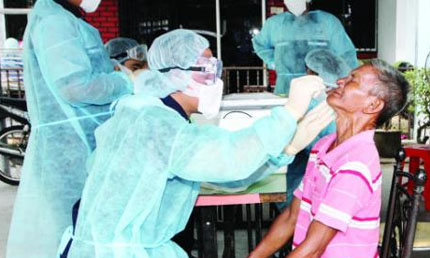 Jeddah, Apr 20: Two foreigners died of MERS in Jeddah, the Health Ministry said Saturday, as fears rise over the spreading respiratory virus in the Kingdom’s commercial hub.
Jeddah, Apr 20: Two foreigners died of MERS in Jeddah, the Health Ministry said Saturday, as fears rise over the spreading respiratory virus in the Kingdom’s commercial hub.
The ministry said five more people were infected with the Middle East Respiratory Syndrome in the western city, including two foreign medics aged 54.
The latest deaths of a 64-year-old and 44-year-old, whose nationalities were undisclosed, bring to 75 the overall number of people to have died of MERS in Saudi Arabia, from a total of 231 infections.
Meanwhile, officials in the Philippines said the government was stepping up its defense against the deadly virus, with the large numbers of Filipino workers in the Middle East seen as potential carriers.
“It is important that families, friends and members of their local communities fully understand all that must be known about the MERS coronavirus,” Health Secretary Enrique Ona told a news conference.
A male Filipino nurse who had tested positive for the MERS virus in the UAE returned to the Philippines on Tuesday, according to the health department.
The man was later tracked down and quarantined, along with relatives who picked him up at Manila airport, as part of the increased monitoring procedures, but all of them were subsequently found to be free of the virus, Ona said.
Health authorities were continuing to track the rest of the 418 passengers on the same Etihad Airways flight, including 45 foreigners, so they could also be tested, he added. The virus has a two-week incubation period, so all those passengers “are still deemed to be at risk”, Ona said.
A total of 119 passengers had so far been contacted by the health department, and all 40 who were tested yielded negative results, Ona said.
While the WHO has not declared a MERS epidemic, the Philippines has stepped up monitoring as it has a large number of workers in the Middle East, many of whom work in Saudi Arabia and the UAE.
Ona said Filipinos traveling to and from their work in the region were being warned of the dangers of the virus and advised to seek immediate attention if they have any symptoms.
Lyndon Leesuy, the health department's program manager for emerging diseases, said all air travelers who exhibit symptoms at Philippine airports would be required to undergo testing for the virus as part of the “active surveillance” status.
President Benigno Aquino has ordered the health department to “create a heightened awareness among our people and prevent the spread of this communicable disease”, Ona said.





Comments
Add new comment